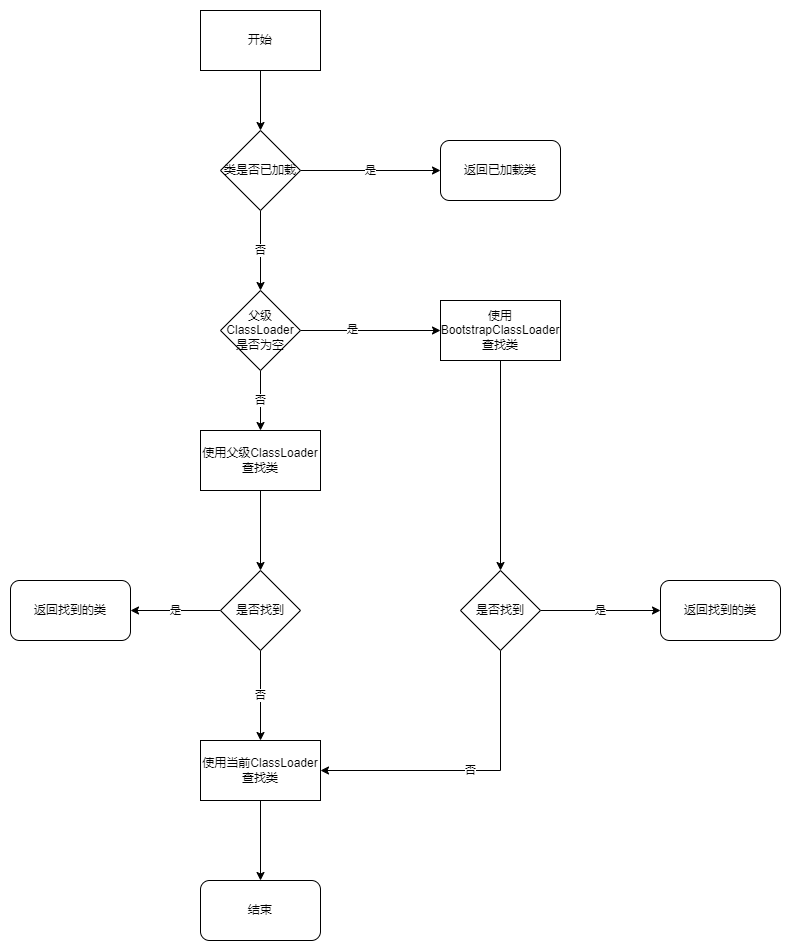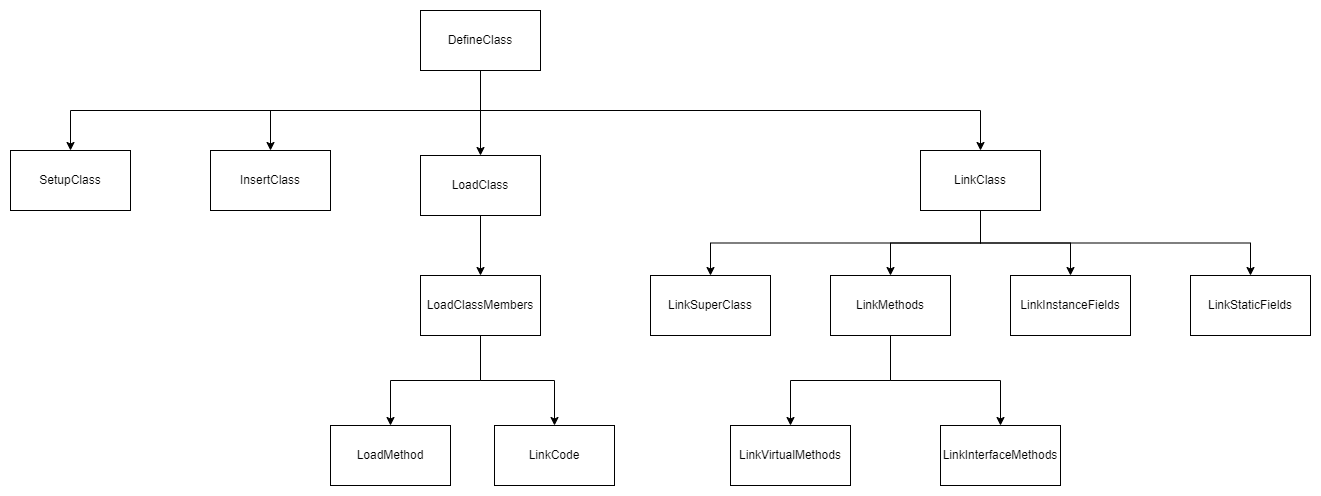

Android类加载流程 - luoyesiqiu
source link: https://www.cnblogs.com/luoyesiqiu/p/classload.html
Go to the source link to view the article. You can view the picture content, updated content and better typesetting reading experience. If the link is broken, please click the button below to view the snapshot at that time.

背景#
由于前前前阵子写了个壳,得去了解类的加载流程,当时记了一些潦草的笔记。这几天把这些东西简单梳理了一下,本文分析的代码基于Android8.1.0源码。
流程分析#
从loadClass开始,我们来看下Android中类加载的流程
/libcore/ojluni/src/main/java/java/lang/ClassLoader.java::loadClass
loadClass流程如下:
protected Class<?> loadClass(String name, boolean resolve)
throws ClassNotFoundException
{
// First, check if the class has already been loaded
Class<?> c = findLoadedClass(name);
if (c == null) {
try {
if (parent != null) {
c = parent.loadClass(name, false);
} else {
c = findBootstrapClassOrNull(name);
}
} catch (ClassNotFoundException e) {
// ClassNotFoundException thrown if class not found
// from the non-null parent class loader
}
if (c == null) {
// If still not found, then invoke findClass in order
// to find the class.
c = findClass(name);
}
}
return c;
}
/libcore/ojluni/src/main/java/java/lang/ClassLoader.java::findClass
protected Class<?> findClass(String name) throws ClassNotFoundException {
throw new ClassNotFoundException(name);
}
ClassLoader类的findClass是没有实际查找代码的,所以调用findClass其实是调用其实现类的findClass函数,例如:BaseDexClassLoader
/libcore/dalvik/src/main/java/dalvik/system/BaseDexClassLoader.java::findClass
每个BaseDexClassLoader都持有一个DexPathList,BaseDexClassLoader的findClass类调用了DexPathList的findClass。
@Override
protected Class<?> findClass(String name) throws ClassNotFoundException {
List<Throwable> suppressedExceptions = new ArrayList<Throwable>();
Class c = pathList.findClass(name, suppressedExceptions);
if (c == null) {
ClassNotFoundException cnfe = new ClassNotFoundException(
"Didn't find class \"" + name + "\" on path: " + pathList);
for (Throwable t : suppressedExceptions) {
cnfe.addSuppressed(t);
}
throw cnfe;
}
return c;
}
/libcore/dalvik/src/main/java/dalvik/system/DexPathList.java::findClass
遍历所有dexElements,并调用Element类的findClass。
public Class<?> findClass(String name, List<Throwable> suppressed) {
for (Element element : dexElements) {
Class<?> clazz = element.findClass(name, definingContext, suppressed);
if (clazz != null) {
return clazz;
}
}
if (dexElementsSuppressedExceptions != null) {
suppressed.addAll(Arrays.asList(dexElementsSuppressedExceptions));
}
return null;
}
题外话,dexElements对象其实是DexPathList$Element类的数组,用于存储已加载的dex或者jar的信息。
/libcore/dalvik/src/main/java/dalvik/system/DexPathList$Element::findClass
Element的findClass,又去调用DexFile类的loadClassBinaryName,可以理解为在单独的dex或者jar对象中加载类
public Class<?> findClass(String name, ClassLoader definingContext,
List<Throwable> suppressed) {
return dexFile != null ? dexFile.loadClassBinaryName(name, definingContext, suppressed)
: null;
}
libcore\dalvik\src\main\java\dalvik\system\DexFile.java::loadClassBinaryName
去调用defineClass函数
public Class loadClassBinaryName(String name, ClassLoader loader, List<Throwable> suppressed) {
return defineClass(name, loader, mCookie, this, suppressed);
}
libcore\dalvik\src\main\java\dalvik\system\DexFile.java::defineClass
调用defineClassNative,准备进入Native层
private static Class defineClass(String name, ClassLoader loader, Object cookie,
DexFile dexFile, List<Throwable> suppressed) {
Class result = null;
try {
result = defineClassNative(name, loader, cookie, dexFile);
} catch (NoClassDefFoundError e) {
if (suppressed != null) {
suppressed.add(e);
}
} catch (ClassNotFoundException e) {
if (suppressed != null) {
suppressed.add(e);
}
}
return result;
}
art\runtime\native\dalvik_system_DexFile.cc::DexFile_defineClassNative
检查dex是否加载,类名是否合理,并遍历DexFile对象,查找Dex文件中的类的定义,找到就去调用ClassLinker::DefineClass函数。
static jclass DexFile_defineClassNative(JNIEnv* env,
jclass,
jstring javaName,
jobject javaLoader,
jobject cookie,
jobject dexFile) {
std::vector<const DexFile*> dex_files;
const OatFile* oat_file;
if (!ConvertJavaArrayToDexFiles(env, cookie, /*out*/ dex_files, /*out*/ oat_file)) {
VLOG(class_linker) << "Failed to find dex_file";
DCHECK(env->ExceptionCheck());
return nullptr;
}
ScopedUtfChars class_name(env, javaName);
if (class_name.c_str() == nullptr) {
VLOG(class_linker) << "Failed to find class_name";
return nullptr;
}
const std::string descriptor(DotToDescriptor(class_name.c_str()));
const size_t hash(ComputeModifiedUtf8Hash(descriptor.c_str()));
for (auto& dex_file : dex_files) {
const DexFile::ClassDef* dex_class_def =
OatDexFile::FindClassDef(*dex_file, descriptor.c_str(), hash);
if (dex_class_def != nullptr) {
ScopedObjectAccess soa(env);
ClassLinker* class_linker = Runtime::Current()->GetClassLinker();
StackHandleScope<1> hs(soa.Self());
Handle<mirror::ClassLoader> class_loader(
hs.NewHandle(soa.Decode<mirror::ClassLoader>(javaLoader)));
ObjPtr<mirror::DexCache> dex_cache =
class_linker->RegisterDexFile(*dex_file, class_loader.Get());
if (dex_cache == nullptr) {
// OOME or InternalError (dexFile already registered with a different class loader).
soa.Self()->AssertPendingException();
return nullptr;
}
ObjPtr<mirror::Class> result = class_linker->DefineClass(soa.Self(),
descriptor.c_str(),
hash,
class_loader,
*dex_file,
*dex_class_def);
// Add the used dex file. This only required for the DexFile.loadClass API since normal
// class loaders already keep their dex files live.
class_linker->InsertDexFileInToClassLoader(soa.Decode<mirror::Object>(dexFile),
class_loader.Get());
if (result != nullptr) {
VLOG(class_linker) << "DexFile_defineClassNative returning " << result
<< " for " << class_name.c_str();
return soa.AddLocalReference<jclass>(result);
}
}
}
VLOG(class_linker) << "Failed to find dex_class_def " << class_name.c_str();
return nullptr;
}
art\runtime\class_linker.cc::DefineClass
DefineClass这个函数做了许多工作,相当于底层类加载逻辑的分发器,整体逻辑如下图:
mirror::Class* ClassLinker::DefineClass(Thread* self,
const char* descriptor,
size_t hash,
Handle<mirror::ClassLoader> class_loader,
const DexFile& dex_file,
const DexFile::ClassDef& dex_class_def) {
StackHandleScope<3> hs(self);
auto klass = hs.NewHandle<mirror::Class>(nullptr);
......
// Get the real dex file. This will return the input if there aren't any callbacks or they do
// nothing.
DexFile const* new_dex_file = nullptr;
DexFile::ClassDef const* new_class_def = nullptr;
// TODO We should ideally figure out some way to move this after we get a lock on the klass so it
// will only be called once.
Runtime::Current()->GetRuntimeCallbacks()->ClassPreDefine(descriptor,
klass,
class_loader,
dex_file,
dex_class_def,
&new_dex_file,
&new_class_def);
// Check to see if an exception happened during runtime callbacks. Return if so.
if (self->IsExceptionPending()) {
return nullptr;
}
ObjPtr<mirror::DexCache> dex_cache = RegisterDexFile(*new_dex_file, class_loader.Get());
if (dex_cache == nullptr) {
self->AssertPendingException();
return nullptr;
}
klass->SetDexCache(dex_cache);
SetupClass(*new_dex_file, *new_class_def, klass, class_loader.Get());
// Mark the string class by setting its access flag.
if (UNLIKELY(!init_done_)) {
if (strcmp(descriptor, "Ljava/lang/String;") == 0) {
klass->SetStringClass();
}
}
ObjectLock<mirror::Class> lock(self, klass);
klass->SetClinitThreadId(self->GetTid());
// Make sure we have a valid empty iftable even if there are errors.
klass->SetIfTable(GetClassRoot(kJavaLangObject)->GetIfTable());
// Add the newly loaded class to the loaded classes table.
ObjPtr<mirror::Class> existing = InsertClass(descriptor, klass.Get(), hash);
if (existing != nullptr) {
// We failed to insert because we raced with another thread. Calling EnsureResolved may cause
// this thread to block.
return EnsureResolved(self, descriptor, existing);
}
// Load the fields and other things after we are inserted in the table. This is so that we don't
// end up allocating unfree-able linear alloc resources and then lose the race condition. The
// other reason is that the field roots are only visited from the class table. So we need to be
// inserted before we allocate / fill in these fields.
LoadClass(self, *new_dex_file, *new_class_def, klass);
if (self->IsExceptionPending()) {
VLOG(class_linker) << self->GetException()->Dump();
// An exception occured during load, set status to erroneous while holding klass' lock in case
// notification is necessary.
if (!klass->IsErroneous()) {
mirror::Class::SetStatus(klass, mirror::Class::kStatusErrorUnresolved, self);
}
return nullptr;
}
// Finish loading (if necessary) by finding parents
CHECK(!klass->IsLoaded());
if (!LoadSuperAndInterfaces(klass, *new_dex_file)) {
// Loading failed.
if (!klass->IsErroneous()) {
mirror::Class::SetStatus(klass, mirror::Class::kStatusErrorUnresolved, self);
}
return nullptr;
}
CHECK(klass->IsLoaded());
// At this point the class is loaded. Publish a ClassLoad event.
// Note: this may be a temporary class. It is a listener's responsibility to handle this.
Runtime::Current()->GetRuntimeCallbacks()->ClassLoad(klass);
// Link the class (if necessary)
CHECK(!klass->IsResolved());
// TODO: Use fast jobjects?
auto interfaces = hs.NewHandle<mirror::ObjectArray<mirror::Class>>(nullptr);
MutableHandle<mirror::Class> h_new_class = hs.NewHandle<mirror::Class>(nullptr);
if (!LinkClass(self, descriptor, klass, interfaces, &h_new_class)) {
// Linking failed.
if (!klass->IsErroneous()) {
mirror::Class::SetStatus(klass, mirror::Class::kStatusErrorUnresolved, self);
}
return nullptr;
}
self->AssertNoPendingException();
CHECK(h_new_class != nullptr) << descriptor;
CHECK(h_new_class->IsResolved() && !h_new_class->IsErroneousResolved()) << descriptor;
// Instrumentation may have updated entrypoints for all methods of all
// classes. However it could not update methods of this class while we
// were loading it. Now the class is resolved, we can update entrypoints
// as required by instrumentation.
if (Runtime::Current()->GetInstrumentation()->AreExitStubsInstalled()) {
// We must be in the kRunnable state to prevent instrumentation from
// suspending all threads to update entrypoints while we are doing it
// for this class.
DCHECK_EQ(self->GetState(), kRunnable);
Runtime::Current()->GetInstrumentation()->InstallStubsForClass(h_new_class.Get());
}
/*
* We send CLASS_PREPARE events to the debugger from here. The
* definition of "preparation" is creating the static fields for a
* class and initializing them to the standard default values, but not
* executing any code (that comes later, during "initialization").
*
* We did the static preparation in LinkClass.
*
* The class has been prepared and resolved but possibly not yet verified
* at this point.
*/
Runtime::Current()->GetRuntimeCallbacks()->ClassPrepare(klass, h_new_class);
// Notify native debugger of the new class and its layout.
jit::Jit::NewTypeLoadedIfUsingJit(h_new_class.Get());
return h_new_class.Get();
}
art\runtime\class_linker.cc::SetupClass
SetupClass设置类的一些基本字段信息。
void ClassLinker::SetupClass(const DexFile& dex_file,
const DexFile::ClassDef& dex_class_def,
Handle<mirror::Class> klass,
ObjPtr<mirror::ClassLoader> class_loader) {
CHECK(klass != nullptr);
CHECK(klass->GetDexCache() != nullptr);
CHECK_EQ(mirror::Class::kStatusNotReady, klass->GetStatus());
const char* descriptor = dex_file.GetClassDescriptor(dex_class_def);
CHECK(descriptor != nullptr);
klass->SetClass(GetClassRoot(kJavaLangClass));
uint32_t access_flags = dex_class_def.GetJavaAccessFlags();
CHECK_EQ(access_flags & ~kAccJavaFlagsMask, 0U);
klass->SetAccessFlags(access_flags);
klass->SetClassLoader(class_loader);
DCHECK_EQ(klass->GetPrimitiveType(), Primitive::kPrimNot);
mirror::Class::SetStatus(klass, mirror::Class::kStatusIdx, nullptr);
klass->SetDexClassDefIndex(dex_file.GetIndexForClassDef(dex_class_def));
klass->SetDexTypeIndex(dex_class_def.class_idx_);
}
延申:mirror命名空间下的类是底层对Java层类的映射,比如:mirror::Class类就是对java.lang.Class类的映射,SetAccessFlags就是对Class类的accessFlags字段赋值。
art\runtime\class_linker.cc::InsertClass
InsertClass函数判断类是否在列表中:
- 如果在列表中,则直接返回;
- 如果没有,则添加到列表。
mirror::Class* ClassLinker::InsertClass(const char* descriptor, ObjPtr<mirror::Class> klass, size_t hash) {
if (VLOG_IS_ON(class_linker)) {
ObjPtr<mirror::DexCache> dex_cache = klass->GetDexCache();
std::string source;
if (dex_cache != nullptr) {
source += " from ";
source += dex_cache->GetLocation()->ToModifiedUtf8();
}
LOG(INFO) << "Loaded class " << descriptor << source;
}
{
WriterMutexLock mu(Thread::Current(), *Locks::classlinker_classes_lock_);
ObjPtr<mirror::ClassLoader> const class_loader = klass->GetClassLoader();
ClassTable* const class_table = InsertClassTableForClassLoader(class_loader);
ObjPtr<mirror::Class> existing = class_table->Lookup(descriptor, hash);
if (existing != nullptr) {
return existing.Ptr();
}
VerifyObject(klass);
class_table->InsertWithHash(klass, hash);
if (class_loader != nullptr) {
// This is necessary because we need to have the card dirtied for remembered sets.
Runtime::Current()->GetHeap()->WriteBarrierEveryFieldOf(class_loader);
}
if (log_new_roots_) {
new_class_roots_.push_back(GcRoot<mirror::Class>(klass));
}
}
if (kIsDebugBuild) {
// Test that copied methods correctly can find their holder.
for (ArtMethod& method : klass->GetCopiedMethods(image_pointer_size_)) {
CHECK_EQ(GetHoldingClassOfCopiedMethod(&method), klass);
}
}
return nullptr;
}
art\runtime\class_linker.cc::LoadClass
LoadClass函数获取了dex文件中的classData部分,然后去调用LoadClassMembers
void ClassLinker::LoadClass(Thread* self,
const DexFile& dex_file,
const DexFile::ClassDef& dex_class_def,
Handle<mirror::Class> klass) {
const uint8_t* class_data = dex_file.GetClassData(dex_class_def);
if (class_data == nullptr) {
return; // no fields or methods - for example a marker interface
}
LoadClassMembers(self, dex_file, class_data, klass);
}
art\runtime\class_linker.cc::LoadClassMembers
LoadClassMembers函数主要逻辑是遍历类中的所有字段和函数,然后分别调用LoadField,LoadMethod和LinkCode
void ClassLinker::LoadClassMembers(Thread* self,
const DexFile& dex_file,
const uint8_t* class_data,
Handle<mirror::Class> klass){
......
LinearAlloc* const allocator = GetAllocatorForClassLoader(klass->GetClassLoader());
ClassDataItemIterator it(dex_file, class_data);
LengthPrefixedArray<ArtField>* sfields = AllocArtFieldArray(self,
allocator,
it.NumStaticFields());
size_t num_sfields = 0;
uint32_t last_field_idx = 0u;
for (; it.HasNextStaticField(); it.Next()) {
uint32_t field_idx = it.GetMemberIndex();
DCHECK_GE(field_idx, last_field_idx); // Ordering enforced by DexFileVerifier.
if (num_sfields == 0 || LIKELY(field_idx > last_field_idx)) {
DCHECK_LT(num_sfields, it.NumStaticFields());
LoadField(it, klass, &sfields->At(num_sfields));
++num_sfields;
last_field_idx = field_idx;
}
}
// Load instance fields.
LengthPrefixedArray<ArtField>* ifields = AllocArtFieldArray(self,
allocator,
it.NumInstanceFields());
size_t num_ifields = 0u;
last_field_idx = 0u;
for (; it.HasNextInstanceField(); it.Next()) {
uint32_t field_idx = it.GetMemberIndex();
DCHECK_GE(field_idx, last_field_idx); // Ordering enforced by DexFileVerifier.
if (num_ifields == 0 || LIKELY(field_idx > last_field_idx)) {
DCHECK_LT(num_ifields, it.NumInstanceFields());
LoadField(it, klass, &ifields->At(num_ifields));
++num_ifields;
last_field_idx = field_idx;
}
}
......
size_t class_def_method_index = 0;
uint32_t last_dex_method_index = DexFile::kDexNoIndex;
size_t last_class_def_method_index = 0;
for (size_t i = 0; it.HasNextDirectMethod(); i++, it.Next()) {
ArtMethod* method = klass->GetDirectMethodUnchecked(i, image_pointer_size_);
LoadMethod(dex_file, it, klass, method);
LinkCode(this, method, oat_class_ptr, class_def_method_index);
uint32_t it_method_index = it.GetMemberIndex();
if (last_dex_method_index == it_method_index) {
// duplicate case
method->SetMethodIndex(last_class_def_method_index);
} else {
method->SetMethodIndex(class_def_method_index);
last_dex_method_index = it_method_index;
last_class_def_method_index = class_def_method_index;
}
class_def_method_index++;
}
for (size_t i = 0; it.HasNextVirtualMethod(); i++, it.Next()) {
ArtMethod* method = klass->GetVirtualMethodUnchecked(i, image_pointer_size_);
LoadMethod(dex_file, it, klass, method);
DCHECK_EQ(class_def_method_index, it.NumDirectMethods() + i);
LinkCode(this, method, oat_class_ptr, class_def_method_index);
class_def_method_index++;
}
......
}
art\runtime\class_linker.cc::LoadField
LoadField设置ArtField结构中字段的一些值
void ClassLinker::LoadField(const ClassDataItemIterator& it,
Handle<mirror::Class> klass,
ArtField* dst) {
const uint32_t field_idx = it.GetMemberIndex();
dst->SetDexFieldIndex(field_idx);
dst->SetDeclaringClass(klass.Get());
dst->SetAccessFlags(it.GetFieldAccessFlags());
}
art\runtime\class_linker.cc::LoadMethod
LoadMethod函数主要做设置ArtMethod结构的一些属性,比如函数的MethodIdx,CodeItem在dex文件中的偏移,函数的AccessFlag等。
void ClassLinker::LoadMethod(const DexFile& dex_file,
const ClassDataItemIterator& it,
Handle<mirror::Class> klass,
ArtMethod* dst){
uint32_t dex_method_idx = it.GetMemberIndex();
const DexFile::MethodId& method_id = dex_file.GetMethodId(dex_method_idx);
const char* method_name = dex_file.StringDataByIdx(method_id.name_idx_);
ScopedAssertNoThreadSuspension ants("LoadMethod");
dst->SetDexMethodIndex(dex_method_idx);
dst->SetDeclaringClass(klass.Get());
dst->SetCodeItemOffset(it.GetMethodCodeItemOffset());
dst->SetDexCacheResolvedMethods(klass->GetDexCache()->GetResolvedMethods(), image_pointer_size_);
uint32_t access_flags = it.GetMethodAccessFlags();
......
dst->SetAccessFlags(access_flags);
}
延申:ArtMethod是存储Java函数在虚拟机内相关信息的结构,它不同于mirror命名空间下的Method类,ArtMethod在Java层没有类与之直接映射。
art\runtime\class_linker.cc::LinkCode
LinkCode函数主要功能是判断代码是否编译从而为函数设置入口代码。
static void LinkCode(ClassLinker* class_linker,
ArtMethod* method,
const OatFile::OatClass* oat_class,
uint32_t class_def_method_index){
Runtime* const runtime = Runtime::Current();
if (runtime->IsAotCompiler()) {
// The following code only applies to a non-compiler runtime.
return;
}
// Method shouldn't have already been linked.
DCHECK(method->GetEntryPointFromQuickCompiledCode() == nullptr);
if (oat_class != nullptr) {
// Every kind of method should at least get an invoke stub from the oat_method.
// non-abstract methods also get their code pointers.
const OatFile::OatMethod oat_method = oat_class->GetOatMethod(class_def_method_index);
oat_method.LinkMethod(method);
}
// Install entry point from interpreter.
const void* quick_code = method->GetEntryPointFromQuickCompiledCode();
bool enter_interpreter = class_linker->ShouldUseInterpreterEntrypoint(method, quick_code);
if (!method->IsInvokable()) {
EnsureThrowsInvocationError(class_linker, method);
return;
}
if (method->IsStatic() && !method->IsConstructor()) {
// For static methods excluding the class initializer, install the trampoline.
// It will be replaced by the proper entry point by ClassLinker::FixupStaticTrampolines
// after initializing class (see ClassLinker::InitializeClass method).
method->SetEntryPointFromQuickCompiledCode(GetQuickResolutionStub());
} else if (quick_code == nullptr && method->IsNative()) {
method->SetEntryPointFromQuickCompiledCode(GetQuickGenericJniStub());
} else if (enter_interpreter) {
// Set entry point from compiled code if there's no code or in interpreter only mode.
method->SetEntryPointFromQuickCompiledCode(GetQuickToInterpreterBridge());
}
if (method->IsNative()) {
// Unregistering restores the dlsym lookup stub.
method->UnregisterNative();
if (enter_interpreter || quick_code == nullptr) {
// We have a native method here without code. Then it should have either the generic JNI
// trampoline as entrypoint (non-static), or the resolution trampoline (static).
// TODO: this doesn't handle all the cases where trampolines may be installed.
const void* entry_point = method->GetEntryPointFromQuickCompiledCode();
DCHECK(class_linker->IsQuickGenericJniStub(entry_point) ||
class_linker->IsQuickResolutionStub(entry_point));
}
}
}
Recommend
About Joyk
Aggregate valuable and interesting links.
Joyk means Joy of geeK


